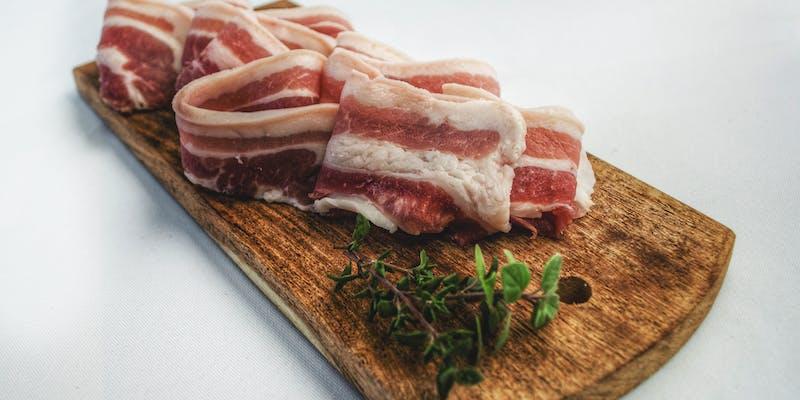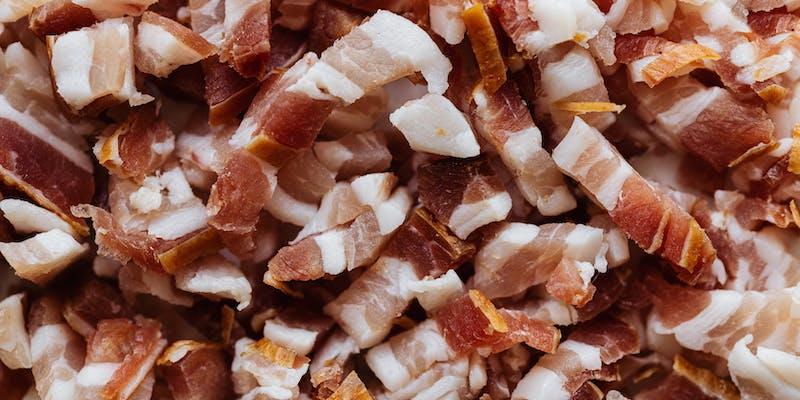Pork is derived from domestic pigs and is a widely consumed red meat, particularly popular in Eastern Asia. Despite its global popularity, pork consumption is banned in various Islamic countries due to religious restrictions, as seen in Islam and Judaism. This meat is highly adaptable, frequently presented in its natural state, or preserved variations such as smoked pork, ham, bacon, and sausages.
It is an abundant protein reservoir and encompasses many vitamins and minerals. Specifically, different types of lean pork nutrition facts 100g can benefit a well-rounded diet. However, excessive consumption of pork can lead to health concerns. Therefore, moderation is key when incorporating pork into your meals.
Dietary Information

Pork is high in protein and fat. A 3.5-ounce (100-gram) serving of cooked ground pork contains these nutrients:
- It has 297 calories.
- The water content is 53%.
- You get 25.7 grams of protein.
- 0 grams carbs
- 0 grams sugar
- 0 grams fiber
- It has 20.8 grams of fat.
Protein in Pork
Pork stands as a significant source of protein in many diets. When considering lean pork, it’s interesting to note that its protein content is about 26% when fresh. However, this percentage soars to nearly 89% when the pork is dried, making it an exceptionally protein-rich food. This feature positions lean pork nutrition facts 100g as a top choice for those seeking to boost their protein intake.
Notably, pork provides all nine essential amino acids. These amino acids are crucial for the body's growth and maintenance, and meat is among the few foods that offer a complete protein profile. This comprehensive nutrient composition makes pork especially beneficial for specific groups. For instance, bodybuilders, recovering athletes, post-surgery patients, or anyone needing muscle repair or growth could find pork particularly advantageous.
Fat in Pork
Pork's fat content varies and can be an essential consideration in dietary choices. The fat percentage typically ranges from 10-16%, but this can increase based on factors such as the cut of the meat and how it's prepared. Lard is clarified pig fat and is often used in cooking, offering a rich flavor profile.
Pork fat has almost equal saturated and unsaturated fats. Monounsaturated fat is 9.3 grams, polyunsaturated fat is 1.9 grams, and saturated fat is 7.7 grams per 100 grams of cooked ground lean pork nutrition facts 100g. Pork differs from beef and lamb in composition. Pork has more unsaturated fats and less CLA. Fat content is crucial when assessing meat cuts' pork nutrition facts value.
Nutritional Benefits Of Pork
Thiamine
Thiamine-rich pork distinguishes it from beef and lamb. B vitamin thiamine is essential for many body functions. It helps convert food into energy and supports heart, muscle, and nervous health. Regular pork consumption provides this vital nutrient, supporting overall health.
Vitamin B6
Pork contains Vitamin B6 for red blood cell production and brain health. The body uses and stores energy from food proteins and carbohydrates with this vitamin. Eating pork regularly helps maintain Vitamin B6 levels, improving health and energy.
Niacin
Pork contains Vitamin B3 niacin, which aids growth and metabolism. It converts food into energy and supports skin, nerve, and digestive health. Pork helps maintain niacin levels, supporting body functions and health.
Phosphorus
Pork provides phosphorus, an essential mineral for body growth and maintenance. It aids in bone and tooth formation and carbohydrate and fat metabolism. It also helps the body make protein for cell and tissue growth, maintenance, and repair. Pork's phosphorus content balances a diet.
Iron
Due to its efficient heme-iron absorption, grilled pork nutrition facts is a good source of iron despite having less than beef or lamb. Animal-based iron is easily absorbed, making pork good for iron levels. This is crucial for anemia prevention and vitality.
Selenium
Selenium, abundant in pork, is an essential mineral in animal products. Its antioxidant properties protect cells, making it important. Thyroid hormone metabolism and immune system function involve selenium. Pork helps maintain selenium levels, improving health.
Zinc
Pork is high in zinc, another vital mineral. It's essential for brain and immune system health. Zinc promotes cell growth, DNA synthesis, and wound healing. Pork is an important part of a balanced diet due to its immune-boosting properties. Zinc intake can be maintained by eating pork regularly.
Vitamin B12
Pork is rich in Vitamin B12, which is found in animal products. Red blood cell production and brain function require this vitamin. Anemia and neurological issues can result from Vitamin B12 deficiency. Pork provides a steady supply of this essential nutrient.
Benefits of Consuming Pork for Health

Pork contains essential proteins vital in maintaining muscle mass, particularly as individuals age. TAge-related muscle loss can cause health problems. Unless controlled, this process can lead to sarcopenia, a condition that reduces muscle mass and quality of life. Sarcopenia primarily impacts the elderly population.
Inadequate consumption of high-quality protein in one's diet can accelerate the decline of muscle mass that occurs with age, potentially increasing the susceptibility to conditions such as sarcopenia. Integrating protein-dense foods such as grilled pork nutrition facts into your dietary regimen is a potent strategy to uphold muscle mass and counteract aging-related deterioration.
Pork amino acid beta-alanine synthesizes carnosine, a muscle-functioning compound. High muscle carnosine levels reduce fatigue and improve performance. Vegetarian and vegan diets deficient in beta-alanine can gradually lower muscle carnosine levels. However, eating grilled pork nutrition facts or other foods high in beta-alanine can boost muscle carnosine. Pork is a great choice for fitness and muscle function enthusiasts.
Drawbacks Of Eating Pork
Avoid raw or undercooked pork, especially in developing countries, due to the risk of human-infecting parasites. The pork tapeworm (Taenia solium) can grow to 10 feet. While rare in developed nations, it is common in Africa, Asia, and Central and South America. Ingesting undercooked pork can cause an infection. Although often asymptomatic, it can cause cysticercosis, affecting 50 million people annually. This can cause epilepsy and other serious health issues.
Concerns include Trichinellosis, caused by Trichinella roundworms. Where pork comes from free-roaming or feral pigs, this condition is more common than in developed countries. Mild symptoms like abdominal pain or nausea can worsen, especially in older people. It can be a leading and evident cause of minor and major muscle pain, along with severely high body temperature. In severe cases, it could lead to demise.







